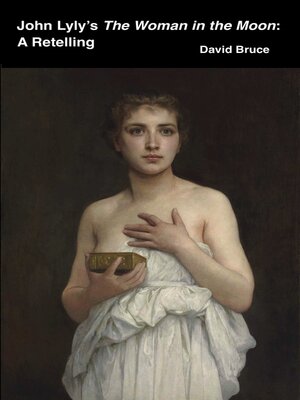
Sign up to save your library
With an OverDrive account, you can save your favorite libraries for at-a-glance information about availability. Find out more about OverDrive accounts.
Find this title in Libby, the library reading app by OverDrive.



Search for a digital library with this title
Title found at these libraries:
| Library Name | Distance |
|---|---|
| Loading... |
This is an easy-to-read retelling of John Lyly's THE WOMAN IN THE MOON, about Pandora, the first woman.
***
Pandora said:
"I'll have the ocean put into a glass, and I'll drink it to the health of Stesias.
"Thy head is full of hedeockes, Iphicles. So, shake them off."
"Hedeockes" may be "head 'ocks," or head-locks, which may be 1) locks of hair, and/or 2) metaphorical locks that bind the mind.
Or, given Pandora's preoccupation with fishing, it may mean "haddocks."
***
Sol descended and said:
"Bright Cyprian Queen, treat Pandora well.
"For although at first Phoebus envied and resented her looks, yet now he admires her glorious hue, and he swears that neither Daphne in the spring, nor glistening Thetis in her orient robe, nor shamefast — that is, blushing — Morning clad in silver clouds, are half as lovely as this earthly saint."
Apollo loved the nymph Daphne and pursued her. She ran from him, and she was transformed into a laurel bush. The laurel became sacred to Apollo.
Thetis is the minor sea-goddess who is the mother of Achilles.
"Thetis" may be an error for "Theia," who was the Greek goddess of sight and the goddess of the blue of the sky. Her "orient robe" may be the sunrise colors after they turn to blue.
Thetis and Theia may be conflated.
***
Stesias said:
"What! Will the shepherds banquet with my wife? Light Pandora, can thou be thus false?
"Tell me where is this wanton banquet kept so that I may hurl the dishes at their heads, mingle the wine with blood, and end the feast with tragic outcries, like the Theban lord where fair Hippodamia was espoused."
When Pirithous, the King of the Lapiths, married Hippodamia, he invited the half-man, half-horse Centaurs. The Centaur Eurytus attempted to rape Hippodamia, and a battle broke out between the Lapiths and the Centaurs. Pirithous, Theseus (Pirithous' best friend), and other men were able to defeat the Centaurs in a battle that came to be known as the Centauromachy.
The Lapiths lived in Thessaly, and Theseus was the King of Athens, so "Theban lord" may be an error for "Thessalian lord" or "Athenian lord."
***
"When I forsake thee, then Heaven itself shall fall," Pandora said.
Gunophilus said, "No, God forbid, then perhaps we should have larks."
If Heaven falls, the birds will fall with it.
A proverb stated, "If the sky falls, we shall have larks."
The proverb meant that something — in this case, Pandora's forsaking Gunophilus — was very unlikely to occur.
***
Pandora continued:
"Go fetch the Black Goat with the brazen heel, and tell the bellwether I do not hear him."
Goats were associated with lustiness, and bellwethers are sheep that lead a flock and on whose neck a bell is hung.
In Greek mythology, an Empusa was a female vampiric being that had a bronze (or copper) leg and could change its shape into various animals. She seduced young men and then drank their blood and feasted on their flesh.
"Wether" means a castrated ram. The bellwether wore a bell.







